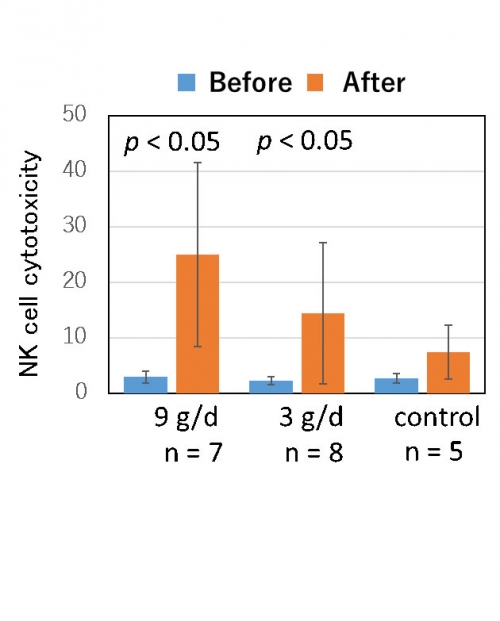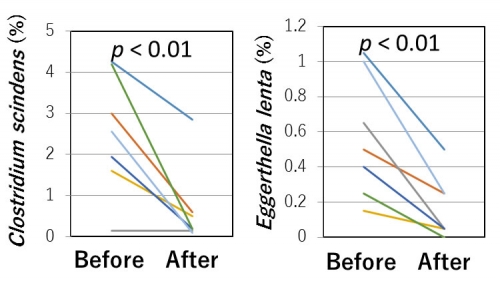研究成果 Research Results
- TOP
- News
- Research Results
- Fermented Papaya Preparation Restores Age-Related Reductions in Peripheral Blood Mononuclear Cell Cytolytic Activity in Tube-Fed Patients
Fermented Papaya Preparation Restores Age-Related Reductions in Peripheral Blood Mononuclear Cell Cytolytic Activity in Tube-Fed Patients
2017.02.03Research ResultsLife & Health
Tube-fed elderly patients are generally supplied with the same type of nutrition over long periods, resulting in an increased risk for micronutrient deficiencies. Dietary polyphenols promote immunity and have anti-inflammatory, anti-carcinogenic, and anti-oxidative properties. In this study, the fermented Papaya preparation was administered to tube-fed elderly patients for 30 days to examine its effects on immunity and the composition of gut microbiota. As a result, peripheral blood mononuclear cell (PBMC) cytolytic activity was restored by dose dependent manner from 3 g/d to 9 g/d, while no other biomarkers of immunity were observed. Treatment with the preparation (9 g/d) significantly reduced the abundance of Firmicutes in the fecal microbiota. In particular, treatment reduced Clostridium scindens and Eggerthella lenta in most patients receiving 9 g/d. Chemical analysis identified low-molecular-weight phenolic acids as polyphenol metabolites; however, no polymerized, large-molecular-weight molecules were detected. Our study indicates that low-molecular-weight polyphenol metabolites fermented from polymerized polyphenols restore PBMC cytolytic activity and modulate the composition of gut microbiota in tube-fed patients.

NK cell cytotoxicity induced by fermented papaya preparation administration for 30 days

Change in abundance of Clostridium scindens and Eggerthella lenta by fermented papaya preparation administration (9 g/d) for 30 days.
Journal Reference
Fermented Papaya Preparation Restores Age-Related Reductions in Peripheral Blood Mononuclear Cell Cytolytic Activity in Tube-Fed Patients, ,PLOS ONE, 10.1371/journal.pone.0169240Research-related inquiries
- TOP
- News
- Research Results
- Fermented Papaya Preparation Restores Age-Related Reductions in Peripheral Blood Mononuclear Cell Cytolytic Activity in Tube-Fed Patients































